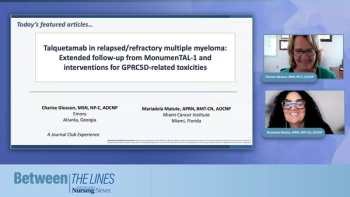Mariadela Matute, APRN, BMT-CN, AOCNP
Articles by Mariadela Matute, APRN, BMT-CN, AOCNP

Panelists discuss that shifting talquetamab dosing from weekly to every 2 weeks improves response durability and patient quality of life, while emphasizing that temporary treatment holds due to adverse effects are manageable, and ongoing research is vital to address unmet needs and advance multiple myeloma care.

Panelists discuss that the phase 2 TALISMAN trial evaluated prophylactic strategies to prevent severe oral toxicities with talquetamab, highlighting the importance of early patient education, multidisciplinary management, and nutritional support to optimize care and maintain quality of life.

Panelists discuss that talquetamab dose modifications are guided primarily by patient symptoms and adverse effects, with treatment pauses for significant toxicities or infections, while response monitoring relies on regular myeloma labs, imaging, and physical exams to ensure safety and efficacy.

Panelists discuss how talquetamab’s unique GPRC5D-related toxicities are managed proactively using International Myeloma Working Group guidelines, balancing outpatient delivery with vigilant monitoring and tailored cytokine release syndrome prophylaxis strategies.

Panelists discuss updated safety findings from GPRC5D-targeted bispecific therapy in relapsed/refractory multiple myeloma, highlighting manageable toxicity—including low infection rates and infrequent neurologic effects like ataxia—alongside sustained efficacy and durability, reinforcing its value as a well-tolerated option for patients ineligible for or resistant to BCMA-directed treatments.

Panelists discuss updated MonumenTAL-1 trial data demonstrating high response rates and prolonged survival with GPRC5D-targeted bispecific therapy in relapsed/refractory multiple myeloma, emphasizing the favorable efficacy, durability, and tolerability of biweekly dosing, which supports improved patient quality of life and positions the therapy as a key option in managing advanced disease.

Panelists discuss the growing promise of GPRC5D-targeted therapy in relapsed/refractory multiple myeloma, highlighting MonumenTAL-1 trial data showing encouraging responses in heavily pretreated patients and emphasizing the importance of managing unique keratin-related and neurologic toxicities linked to GPRC5D expression.

Panelists discuss the evolving role of bispecific antibodies in relapsed/refractory multiple myeloma, emphasizing their value as off-the-shelf options for patients post chimeric antigen receptor T-cell therapy or ineligible for it, and highlighting personalized treatment decisions based on prior therapies, antigen targets, infection risk, and emerging clinical evidence.


